Review of 2023 Presidential Candidates Policies
- Feb 8, 2023
- 9 min read
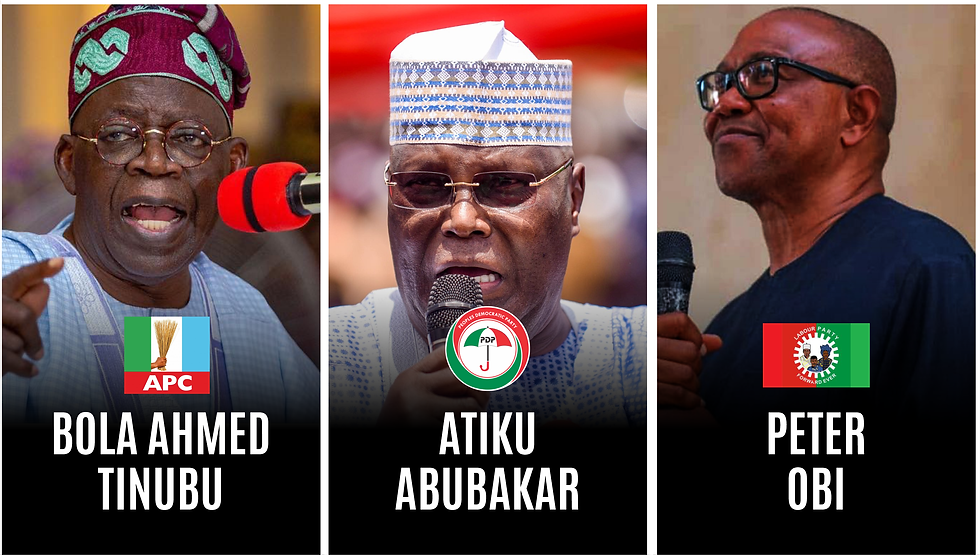
Nigeria, in practical sense commenced its electoral journey in 1964; having achieved the status of a republic in 1963. The election was marred by violence and manipulations, the ensuing crises led to series of riots in the Western region and created a situation that came to be known as Wild-Wild West, this was a sign that showed early enough that Nigeria may struggle with elections in its political journey to nationhood especially as every crisis came with adverse effect on the operational take-off of the government thereby resulting to hurriedly prepared policies that most times failed to address salient issues of national interests.
Policy makers in Nigeria have made series of trade policies through various objectives, for example the export promotion strategy in 1981; exchange rate liberalization and trade liberalization in 1986; creation of Nigerian Export–Import in 1991; and several trade bilateral and multilateral agreements with different countries among others. The main objectives of these trade policies are: to achieve Nigeria's macroeconomic stability and to improve trade nexus with the global community via hitch-free inflow and outflow of both liquidity and non-liquidity transactions across the borders.
The sustainability of Nigeria's nationhood is directly proportional to what could be regarded as her economic stability and because Nigeria is Africa's largest economy and 31st in the world with a GDP that currently stands at $441 billion and immense growth potential, improving on this records and maximizing the potentials requires electing leaders who are up to date with the economic realities and challenges, who also have clear blue print on policies and actual activities that can translate into prosperity. As Nigeria approach another election, what may likely be the performance of the Nigerian President for the next dispensation on policies in the key areas critical to trade and investment namely; Import restriction, foreign exchange and security are a reflection of the categorical statements they have made in their different manifestoes. Below are excerpts and analyses of the manifestoes of the three leading presidential candidates.
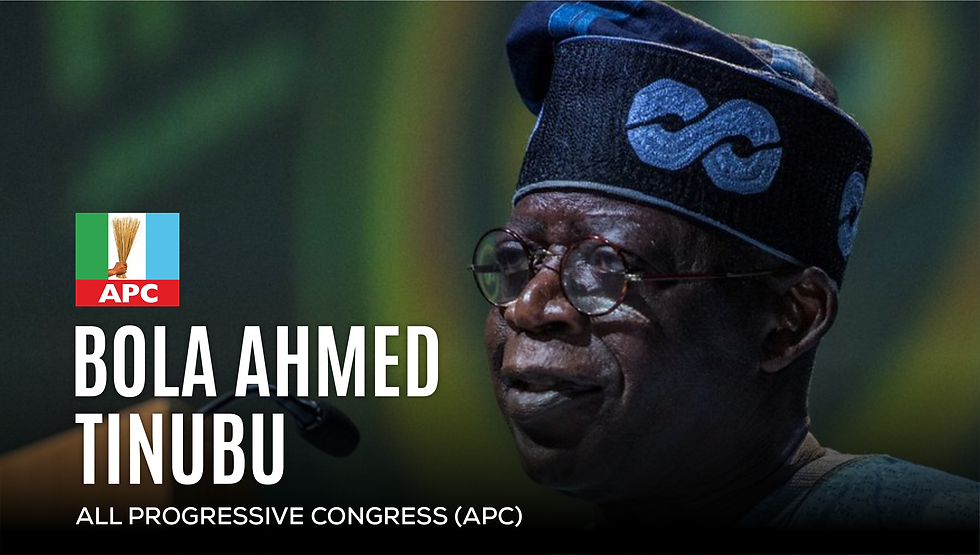
POLICY: SECURITY
This candidate believes that government's fundamental responsibility is to protect its citizens' lives and property. He made a categorical statement about adopting a proactive and intelligence-driven security approach to sufficiently address the nation’s security threats, mobilizing the totality of the national security, military, and law enforcement assets to protect all Nigerians from danger and from the fear of danger as well as expanding and improving upon the use of technology, enhance the recruitment of personnel, and bolster existing agencies and systems to achieve this fundamental national security goal through the underlisted approaches
1. Bolster Nigeria Security Forces
2. Redefine Military Doctrine and Practice
3. Secure Critical National Infrastructure
4. Build Peaceful Communities, Secure Borders, Safe Forests
5. Create Integrated Identity Database
6. Reposition The Police
POLICY: EXCHANGE RATE MANAGEMENT
The exchange rate is perhaps the most evocative monetary issue of the day. It stirs emotions and feelings of national pride or embarrassment, depending on the rate of the day and the trend it suggests. The exchange rate influences the costs of imports, the competitiveness of exports, and net capital flows among other things. It cannot be ignored nor left to the vagaries of an unrestrained market. Yet, we must be precise regarding economic cause and effect. The recent dip in our exchange rate is primarily due to global supply and production shortfalls caused by global factors well beyond the scope of our control. Our diminished levels of oil production and the modest capacity of our manufacturing sector to expand production both serve to compound the pressure on the naira.
Further compounding our difficulty is the fact that we are tied to an ineffective regime of multiple, somewhat arbitrary, exchange rates. This situation gives rise to financial dislocation, currency speculation and arbitrage. These practices divert much needed funds away from productive endeavors that could employ hundreds of thousands of people and create products that improve average living conditions. Bola Ahmed Tinubu intend to work with the Central Bank and the financial sector to carefully review and better optimize the exchange rate regime. He promised to build economic policies that would be guided by the Nation’s desire for a stronger, more stable Naira founded upon a vibrant and productive real economy.
POLICY: IMPORT RESTRICTION
Intends to curb the nation’s reliance on imported goods by discouraging importation of non-essential products through policy measures including luxury taxes, higher tariffs, and higher processing fees as well as incentivize international brands with tax credits, rebates, and other fiscal incentives to establish manufacturing plants in Nigeria both for export and to meet the needs of the large population of consumers in Nigeria and the wider ECOWAS region. He also promised to enact new policies to exploit the framework provided by the African Continental Free Trade Agreement (AfCTA) to further boost domestic manufacturing and production.
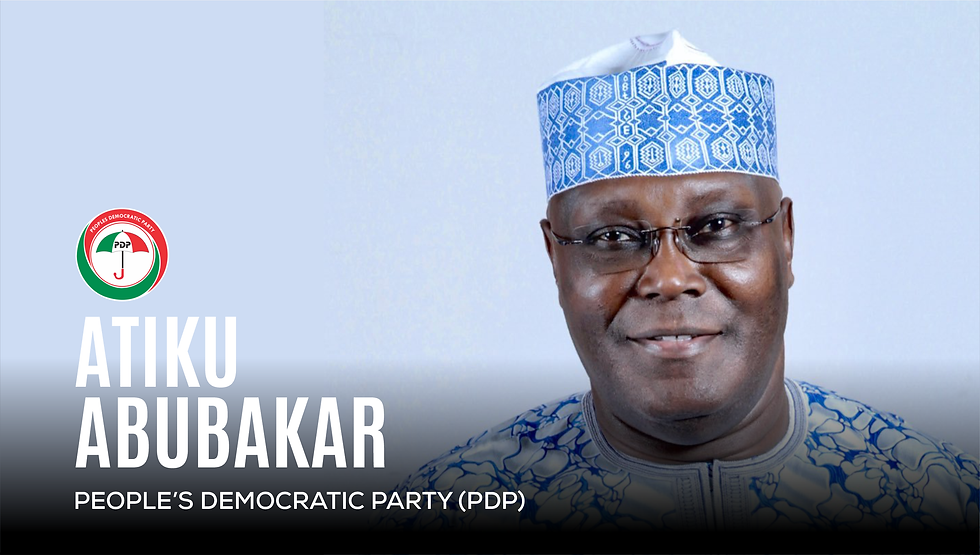
POLICY: SECURITY
Atiku Abubakar promised a faithful implementation of a development agenda with particular reference to creating massive productive employment opportunities, especially for the economically marginalized demographics as significant steps towards negating the factors that tend to escalate insecurity and its challenges in the country through the following approaches
Community/local policing: Initiating a constitutional amendment to allow States who are willing and able to do so to establish their own State Police. This is to enhance local security based on the laws of those States, as distinct from federal laws which will be enforced by the Federal Police.
Increasing the size of security outfits: massive recruitment into all of Nigeria’s security outfits especially the Nigeria Police so that additional 1,000,000 policemen and women will be added to the existing total of less than 400,000 - in 4 years.
Promoting good governance and inclusiveness: Adhering strictly to the principles of good governance at all tiers and organs of government can reduce citizens’ frustration and alienation while eliminating the compulsion to take up arms against society or fellow countrymen.
Provision of adequate resources: Addressing the challenges of the security budget, security spending, and how these are handled focusing especially on the problems of corruption, indiscipline, and welfare of our officers and men within the security architecture.
Improving the welfare of security personnel: Taking bold and effective Presidential interventions such as the Presidential Committee on Barracks Rehabilitation (PCBR) to address issues of motivation and welfare of our officers and men in the various security outfits.
Enhancing the capacity of security personnel: Training and retraining of security agencies on intelligence, contemporary counter-terrorism measures etc.
More structured dialogue: Embarking on a policy of strategic engagements with agitating groups but without compromising Nigeria’s national sovereignty.
Public Mobilization and Sensitization: Re-invigorating the National Orientation Agency (NOA) to carry out its mandate of sustainable mobilization of Nigerians on issues of national unity, peaceful coexistence, cooperation, and consensus-building as strategies for creating the appropriate socio-political climate for peace-building
Alternative approaches to conflict resolution: Dealing with insurgency using alternative approaches to conflict resolution such as diplomacy; intelligence; improved border control; traditional institutions and good neighborliness.
POLICY: EXCHANGE RATE MANAGEMENT
Remove uncertainty in Nigeria’s financial and foreign exchange markets by designing and implementing a sound foreign ex-change management policy to stimulate inflows and eliminate price distortions
POLICY: IMPORT RESTRICTION
Achieve a sustained increase in manufacturing output. By 2030, the manufacturing sector’s output shall be expanded from 9% to 30% of GDP.
Gradually reduce the sector’s dependence on imported raw materials as input into the production process. Looking inwards will promote value addition, generate more jobs, reduce demand for foreign exchange and generally promote sustainable development.
Achieve a diversified production structure with more processing of domestic raw materials, a select list of light, intermediate and heavy goods industries, and a substantial complement of manufactured exports.
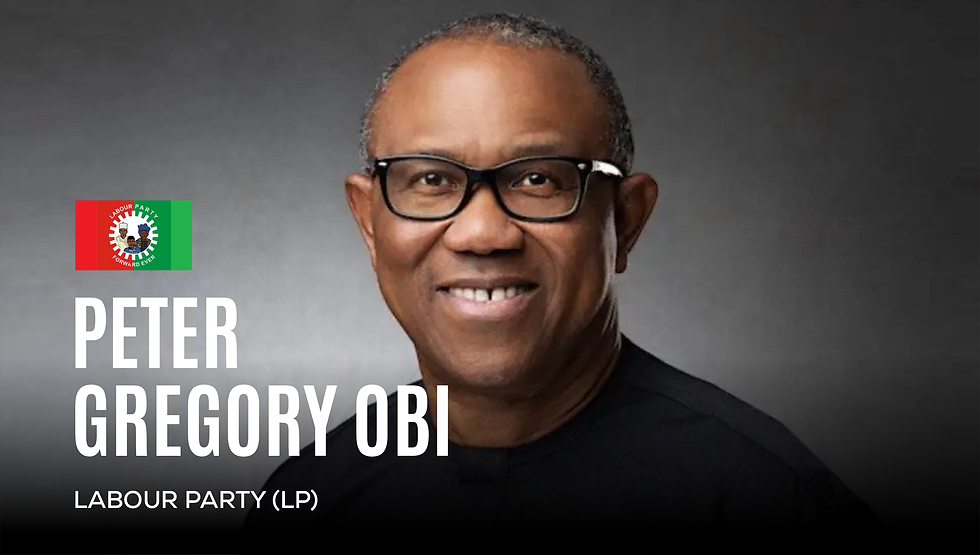
POLICY: SECURITY
This candidate intends to deal with insecurity by putting a permanent end to the incessant banditry, insurgency, kidnapping and cross-border terrorism through the following actions:
Activate all the necessary regional cooperations and arrangements for securing our borders with neighboring countries in west and central Africa, particularly Niger, Chad, and Cameroun
Increase the personnel of our armed forces, police, and other security agencies and optimally equip, train, and fund them to respond adequately to security threats
Deploy state-of-the-art military technology to fight terrorists, bandits, insurgents, and kidnappers
Recreate community relations with security agencies in order to increase public trust and build human intelligence to restore law and order in the communities.
Pursue proactively and deliberate policies that will implement the fundamental objectives and directive principles of state police in the constitution so as to create a secure society that reduces the social pressure for crimes and provides a viable livelihood for the youths. This will be in fulfillment of the obligation of government to ensure the ‘security and welfare of the people’.
Engage, support, and partner, with national and sub-national institutions and governments and network them into an integrated and reinforced onslaught against insecurity. This requires decentralized and professional management of security institutions and the use of grant-in-aid to encourage efficient criminal justice administration at subnational levels, namely, state, local government, and community security administration. To deal with cross-border crimes, we will also adjust security modalities to address gaps and vulnerabilities arising from our obligations under the ECOWAS Protocol on the Movement of Persons.
Reforming the security sector, with particular emphasis on re-focusing the military on external threats and border protection, and the police on internal security threats and law enforcement.
Swift, firm and fair prosecution of criminals, bandits, and terrorists to end impunity.
Enhanced coordination among security agencies to enhance operational efficiency, Fair and transparent administration of justice hinged on the rule of law.
Improve the functioning and effectiveness of our security agencies particularly the police, by strengthening their civilian oversight as well as increasing their size, equipment, funding, and enhancing their professional training.
Strengthen the Ministry of Interior, the Ministry of Police Affairs, and other regulatory and supervisory agencies to provide robust and regulatory oversight and enhance coordination and performance of statutory mandates of the security services. To secure Nigeria, end banditry and insurgency, and unite our dear nation, to manage our diversity such that no one is left behind.
Ensure, in accordance with Section 33 of the Constitution of the Federal Republic of Nigeria (1999 as Amended), that every Nigerian life is protected at all cost. The basic minimum of DEMOCRATIC CITIZENSHIP is that every Nigerian life is protected by the state. There shall be no more impunity. All criminals are equal and will be equally prosecuted and punished. No persecution; no privilege. The same law for the rich and the poor, the powerful and the powerless.
POLICY: EXCHANGE RATE MANAGEMENT
Enact transparent and specially targeted fiscal and trade policies designed to stimulate investment and growth
Deal with revenue shortfalls and leakages such as oil theft and deal decisively by holding persons in positions of authority fully accountable.
Design fiscal and monetary policy that will be properly coordinated with each deploying conventional tools transparently instead of distorting markets to favor a few privileged persons.
Demand the transparent liberalization of the foreign exchange market and dismantle the opaque multiple exchange rate regime which effectively subsidizes a few privileged persons, whilst depriving government of badly needed revenues.
Remove unaffordable subsidies, and use carefully calibrated transfers to cushion any adverse impact on the economically weak.
POLICY: IMPORT RESTRICTION
Apply entrepreneurial governance to dismantle the impediments to free trade and ease of doing business, solve the problems of high logistics costs at the ports, borders, and roads and make Nigeria’s business environment competitive.
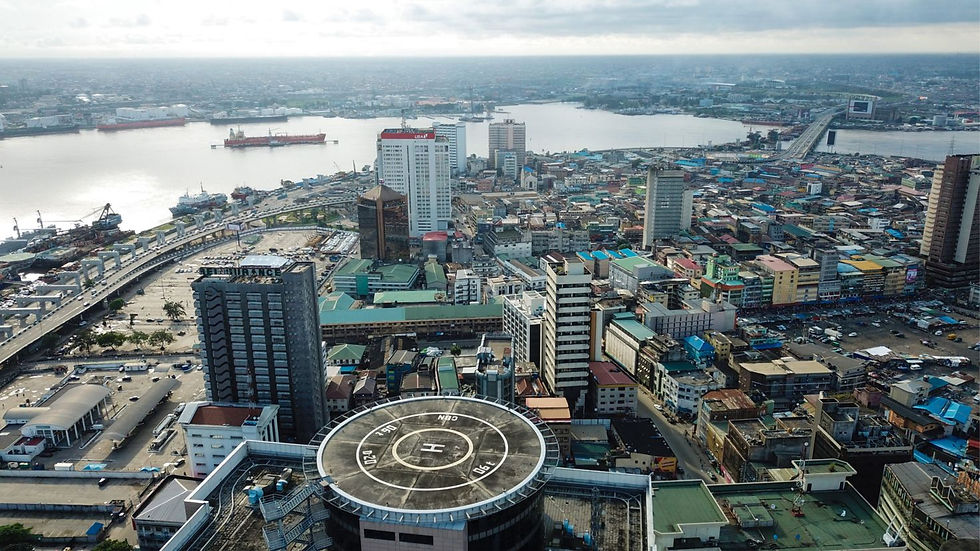
ANALYSIS/CONCLUSION
Nigeria does not lack manifestoes - public declaration of policy and aims presented by political candidates during election periods, as a matter of guess or moderate exaggeration, one may say that there’s no nation on the Africa continent that has archive of fantastic and brilliant un-implemented ideas like Nigeria, these ideas are there, but they amount to nothing when they are not implemented. The three leading presidential candidates whose manifestoes are reviewed in this document have clearly declared their aims, but to guess who could be better in the aspect of implementation (since it is implementation that would translate to results and not just declaration) it is important to assess their individual declaration based on the “HOW”.
For instance, how does the three candidates intend to implement the approaches they have presented to tackle insecurity. In 2014, under the administration of the former President Goodluck Jonathan, Nigerians across regions and geo-political zones were gathered to operate under a complete autonomy to make the best judgments for the country through a national confab, part of the recommendations of the confab on security was to establish states police as against the current police formations which a large percentage of Nigerians believe to have been obsolete and no longer sensitive to the new security challenges facing the country. There have since been several calls by Nigerians for the Mohammadu Buhari’s administration to implement the confab, these calls suggests that Nigerians believe the establishment of state police would solve the problem of insecurity.
While the approach presented by each of the three candidates can be seen as laudable, it is only Mr. Peter Gregory Obi of the Labor Party that is unequivocal about the establishment of states police for which his manifesto could be perceived to be more people-centered when compared to that of other candidates. Another thing to consider about the HOW is the funding of some of the aims and intentions declared by these candidates. Nigeria is currently hugely indebted and the reality index suggests that it may be impossible for the country to continue to borrow, also in the two other areas namely; Import restrictions and foreign exchange, the candidates of the APC and PDP makes declaration that one can perceive to be unrealistic especially as paths leading to implementation were not clearly shown, but the candidate of the labor party in his declarations appeared to be specific about the HOWs with indications suggestive of the fact that implementation of his aims may be realistic.




Comments